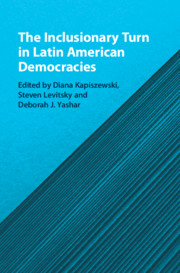Book contents
- The Inclusionary Turn in Latin American Democracies
- The Inclusionary Turn in Latin American Democracies
- Copyright page
- Contents
- Figures
- Tables
- Contributors
- Acknowledgments
- Prologue: Reflections on Two Episodes of Popular Inclusion
- 1 Inequality, Democracy, and the Inclusionary Turn in Latin America
- Part I Extending Social Policy and Participation
- Part II Inclusion and Partisan Representation
- Part III New Party–Society Linkages
- Part IV Inclusion, Populism, and Democracy
- References
Prologue: - Reflections on Two Episodes of Popular Inclusion
Structuring and Restructuring Arenas of Participation
Published online by Cambridge University Press: 12 January 2021
- The Inclusionary Turn in Latin American Democracies
- The Inclusionary Turn in Latin American Democracies
- Copyright page
- Contents
- Figures
- Tables
- Contributors
- Acknowledgments
- Prologue: Reflections on Two Episodes of Popular Inclusion
- 1 Inequality, Democracy, and the Inclusionary Turn in Latin America
- Part I Extending Social Policy and Participation
- Part II Inclusion and Partisan Representation
- Part III New Party–Society Linkages
- Part IV Inclusion, Populism, and Democracy
- References
Summary
These reflections adopt a macro-historical perspective on the “new inclusion,” comparing it to the more restricted, “initial” inclusion of the labor movement in the early twentieth century. The earlier inclusion, which introduced mass participation, founded and structured two arenas of popular sector participation: the interest and party-electoral arenas. The second inclusion not only encompassed previously omitted groups but also restructured those two participatory arenas. After situating both inclusionary episodes in a wider historical framework, I compare them in terms of four traits: 1) the form of popular organizations, 2) problems of collective action, 3) salient cleavages and issues, and 4) access to policymaking. The restructured arenas represent a move from the centrality of unions, corporatism, and productionist economic issues to a structure of participation that is more fragmented and pluralist, with multiple cleavages and a set of issues that now include a range of identity-based rights and consumption-based demands. While these changes are positive gains, an important question is the degree to which this restructuring has effectively demobilized the popular sectors on important macro and micro economic issues. These are important areas of policymaking, which remain salient in the politics of the elite and have consequential economic, distributional, and political consequences for the popular sectors.
- Type
- Chapter
- Information
- The Inclusionary Turn in Latin American Democracies , pp. xxv - xlviiiPublisher: Cambridge University PressPrint publication year: 2021
References
- 1
- Cited by



